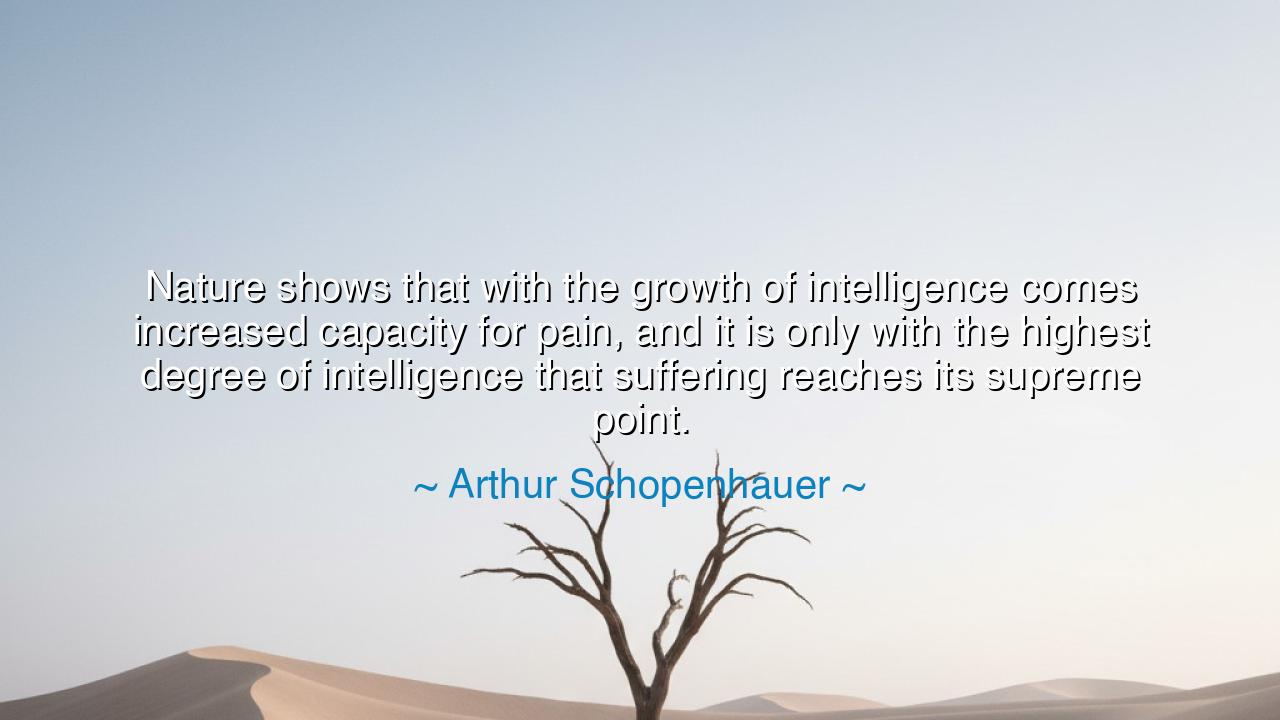
Nature shows that with the growth of intelligence comes increased
Nature shows that with the growth of intelligence comes increased capacity for pain, and it is only with the highest degree of intelligence that suffering reaches its supreme point.






“Nature shows that with the growth of intelligence comes increased capacity for pain, and it is only with the highest degree of intelligence that suffering reaches its supreme point.” – Arthur Schopenhauer
In this dark yet profound reflection, Arthur Schopenhauer, the philosopher of sorrow and truth, unveils one of the deepest mysteries of human existence: that intelligence and suffering are bound together, as light and shadow. He teaches that the more the mind awakens to understanding, the more it perceives the suffering woven into the fabric of life. The beast, ruled by instinct, feels pain only in the moment — the pang of hunger, the wound of the hunt — but the human, endowed with consciousness, suffers beyond the present. He remembers loss, he foresees tragedy, he imagines despair. Thus, to think is also to feel deeply. In the ascent of intelligence, there is triumph, but also torment — for awareness opens the gates of joy and agony alike.
The origin of this idea lies in Schopenhauer’s philosophy of pessimism, born from his study of the natural world and the human soul. He saw life as a ceaseless struggle of desire and dissatisfaction — the “Will to live” that drives every being to strive, hunger, and suffer. In nature, he observed that the simplest creatures live in simplicity of pain: they act, they react, they perish. But as evolution gives rise to consciousness, the mind becomes aware of mortality, of loss, of futility. The animal fears danger; man fears existence itself. Thus, the gift of intelligence becomes also the burden of suffering. For Schopenhauer, to see clearly is to suffer deeply, because to understand life is to understand its impermanence and its endless craving.
And yet, though his words sound bleak, they reveal a truth of immense spiritual depth. For if suffering increases with intelligence, then it is through pain that humanity finds wisdom, compassion, and meaning. The dull mind feels only its hunger; the awakened mind feels the hunger of the world. The sage, the poet, the artist — those most gifted with understanding — are also those who bear the heaviest sorrows. But they transform their pain into beauty, their despair into insight. In this, suffering becomes not a curse, but a crucible — the fire that purifies the soul, forging empathy and truth from the raw metal of existence.
Consider the story of Vincent van Gogh, that radiant spirit whose genius illuminated the canvas yet was haunted by unbearable darkness. He saw the world not as others did — every star pulsed with life, every field whispered of eternity — and in that heightened perception lay both his glory and his torment. His art was born of agony and awe; his intelligence magnified both beauty and pain until they were indistinguishable. Van Gogh’s life is the embodiment of Schopenhauer’s truth: that with greater awareness comes greater vulnerability, for to see the world as it truly is is to feel both its ecstasy and its sorrow. Yet his suffering was not in vain — from it came creation, the echo of eternity caught in color and form.
Schopenhauer’s words also echo in the hearts of those who have led humanity through moral and intellectual revolutions. Socrates, condemned for questioning the ignorance of his time, drank his hemlock not in despair, but in serenity — for he had learned that wisdom and suffering walk together. The Buddha, too, after confronting the inevitability of death, decay, and loss, found enlightenment not by denying suffering but by understanding it. In their pain lay awakening; in their intelligence lay compassion. These figures remind us that the highest intelligence does not flee pain but faces it, and in doing so, transcends it.
Yet we must not mistake Schopenhauer’s insight for hopelessness. It is not a lament, but a revelation of responsibility. To think, to feel, to know — these are gifts that demand courage. For the intelligent soul sees the world’s cruelty and yet must still choose kindness; it feels the futility of existence and yet must still create meaning. In this paradox lies the nobility of the human condition. Pain, then, is not an obstacle but a teacher, guiding the wise toward understanding and the compassionate toward action. To suffer deeply is to live deeply — and to live deeply is to know what it means to be human.
So let this be the lesson passed down: do not flee from suffering, for it is the shadow of your consciousness. The more you see, the more you will feel — and that is not weakness but greatness. Use your intelligence not to escape pain, but to transmute it: let your sorrow become empathy, your confusion become wisdom, your wounds become sources of light for others. For as Schopenhauer teaches, the highest intelligence brings the deepest suffering — but it is also the only path to the highest compassion. And when one learns to bear that burden with grace, one becomes not the victim of life’s pain, but its redeemer, transforming darkness into understanding, and despair into the radiance of truth.






AAdministratorAdministrator
Welcome, honored guests. Please leave a comment, we will respond soon